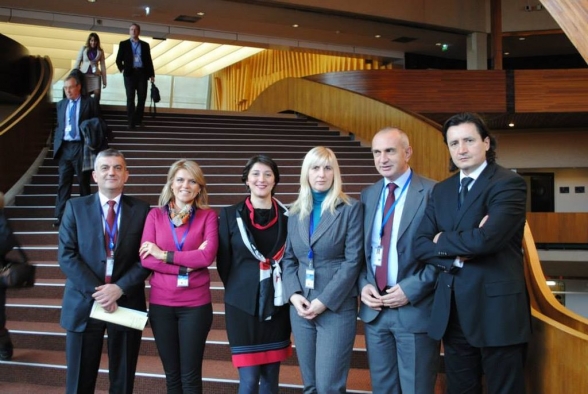On day three of the PACE Winter Session, during the morning, the topic “Internet and politics: the impact of new information and communication technology on democracy” was discussed. Member of Montenegrin delegation to the Parliamentary Assembly of the Council of Europe MP Mladen Bojanić participated in the discussion.
Stating that he came from Montenegro, where 49.9% of citizens had access to the Internet, MP Bojanić emphasised that the rest of the citizens had no possibility of receiving information via Internet or expressing the opinion in that way. He said that on the Internet the number of information not supported by the credible sources or valid proofs has increased, thus the suspicion with regard to the information has been increased as time passes.He said that it was an open secret that all political subjects have their own Internet activists, who have been very active at social networks. Web portals are overwhelmed by anonymous comments, with a significant number of misinformationorpartial information. He assessed that for the sake of democracy it was better not to have information than to have misstatement. MP Bojanić said that he considered democracy as a tool in education, which should be a basic holder for spreading democracy where it lacked and introducing it where it have not existed. He stressed that the Internet might help in spreading democracy, primarily as a help in introducing new knowledge, which could result in development of full and sustainable democracy. Everything else is under the risk of existing as long as someone else appears with better and faster communication technology, which would be overture for new temptations and new risks for democracy, MP Bojanić concluded.
Parliamentary Assembly of the Council of Europe invited all member states i.e. their political and particularly parliamentary institutions to increase the usage of information and communication technologies, in order to achieve democracy and establish dialogue with citizens. The Resolution, adopted on the basis of the Report composed by newly-appointed president of the Parliamentary Assembly of the Council of Europe Ms Anne Brasseur (Luxembourg, ALDE), warns at the risk of Internet misuse, which can result in violating human rights, rule of law and democracy. Additionally, the importance of self-regulation was pointed out, which includes the responsibility of main Internet operators for information published via the Internet.
Mr Martin Schulz, President of the European Parliament, addressed MPs of the Parliamentary Assembly of the Council of Europe today, emphasising that the Parliamentary Assembly of the Council of Europe and European Parliament were natural partners. He voiced expectation that the co-operation between the two institutions would grow and strenghten, stating that those were already working successfully together in activities such as election observation. Mr Schulz also mentioned synergies in the framework of respect for human rights, preservation of democracy and stability of rule of law. He said that the European Parliament has been already using the expertise of the Council of Europe, including the reports of the Venice Commission and the judgments of the European Court of Human Rights. The President of the European Parliament said that the forthcoming accession of the European Union to the European Convention of Human Rights would be a “historic milestone”.
During the afternoon, at the PACE plenary meeting, the topic of migrants was discussed, with the conclusion that European states should do more to correct “misconceptions” about migrants, in particular those propagated by certain politicians and the media, since the evidence overwhelmingly suggests that they could be a benefit to society. They can fill labour shortages and are a source of cultural enrichment of the society. The Assembly said so-called “integration tests” for migrants – used more and more by some countries – could in fact hinder integration and even foster exclusion.
In view of the alarming situation of Syrian refugees – estimated by the UNHCR to number over 3 million at the end of 2013 – PACE has called on member and observer States to "show generosity and solidarity" in admitting these refugees to their territory, while recommending a balanced distribution amongst countries. PACE voiced particular concern about the situation of women and children, who account for the great majority of these refugees, pointing out that the children were encountering problems with access to education and that many women were suffering violence. In the Resolution unanimously adopted today, PACE expressed its gratitude to the Turkish, Jordanian, Lebanese and Iraqi authorities for having taken in an enormous number of Syrian refugees. It also thanked the Council of Europe member States which have agreed to accommodate them – in particular Armenia, Austria, Bulgaria, France, Germany, Luxembourg, Sweden, Switzerland and Turkey.
Committee on Political Affairs and Democracy, Committee on Migration, Refugees and Displaced Persons and Sub-Committee on Human Rights held meetings today, and members of Montenegrin delegation participated in those.
Tomorrow, the following will be discussed at the plenary session of the Parliamentary Assembly of the Council of Europe: Urgent debate on the functioning of democratic institutions in Ukraine, Acceleration of the action against global inequalities and European contribution to the Millennium Development Goals as well as climatic changes and sustainable development.
Mr Werner Faymann, Austrian Chancellor, will address PACE MPs at the session tomorrow.
Montenegrin delegation in the Winter Session is composed of Mr Zoran Vukčević PhD, Head of the delegation, and members of the delegation: Ms Draginja Vuksanović, PhD, Mr Mladen Bojanić, Mr Predrag Sekulić, PhD and Ms Snežana Jonica.








